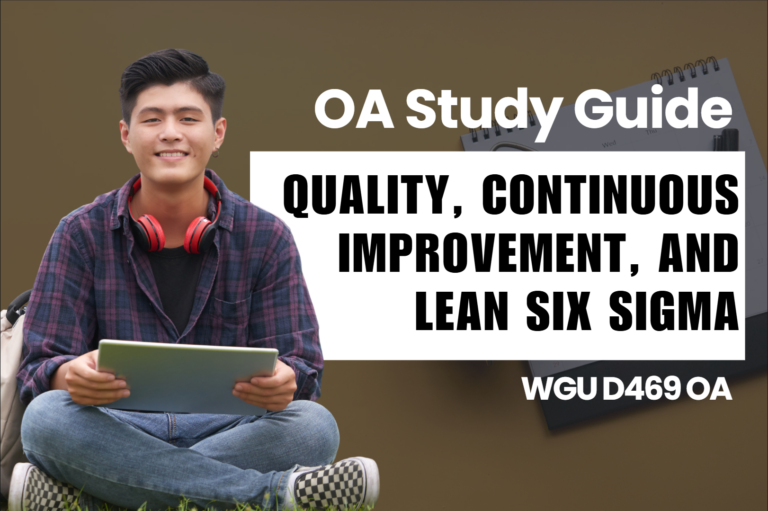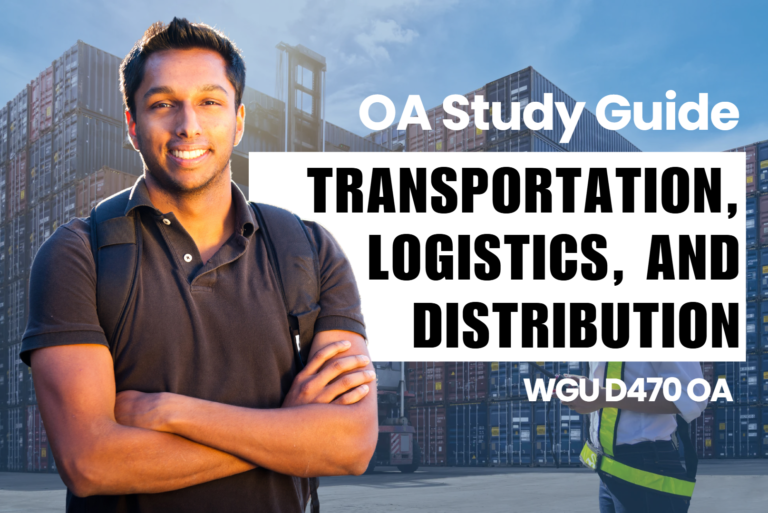Hello everyone! Welcome to our study guide for the Taxation I C237 module, specifically designed for WGU’s C237 Objective Assessment. If you are new to this module, you might be overwhelmed by the course content or you might not know where to start your studies to effectively master C237. So we’ve put together a practical plan to help you do well in this module. We’ve carefully studied the course material to find the most important information you’ll need and how to get it. This guide aims to clear up any confusion you may have about preparing for the assessment, so you can feel confident going into it.
In this article, we will break down the module into sections below.
Just follow our easy steps, and we’re confident you’ll succeed. Without further ado, let us begin!
...
About the Module WGU C237 📖
Welcome to Taxation I WGU C237, a comprehensive module designed to equip you with a solid understanding of the taxation system for individuals. This course will provide you with a foundational overview of income taxes for both individuals and business entities. You will gain insights into the complexities and sources of tax law, enabling you to measure and analyze the effects of various tax options. By the end of this course, you will have a thorough understanding of individual taxation principles and be capable of developing effective personal tax strategies. Additionally, you will be introduced to the taxation of sole proprietorships and learn how to conduct tax research on complex issues.
Throughout this module, you will explore a range of topics crucial to mastering taxation. The course begins with an introduction to tax and proceeds to cover tax compliance, the IRS, and other tax authorities. You will learn about tax planning strategies and the limitations associated with them. An essential part of the curriculum includes an overview of individual income tax, including dependents and filing status. You will also delve into taxable entities in the US, individual deductions, property dispositions, business income, deductions, and accounting methods. Finally, the module covers individual income tax computation and tax credits, providing you with the knowledge necessary to navigate the intricacies of the tax system.
By completing this module, you will acquire the below competencies.
- Federal Taxation – 18% of the assessment
- Taxation of Individuals- 76 % of the assessment
- Tax Research – 6% of assessment
To prepare for the final exam, it is crucial to stay on top of the course content and actively participate in all learning activities. Regularly review the material covered in each lesson and practice applying the concepts through exercises and case studies. Utilize available resources such as textbooks, online databases, and tax software to enhance your understanding. Engaging in discussions with peers and seeking clarification from your instructor on complex topics will also be beneficial. By following these strategies and dedicating time to thorough preparation, you will be well-equipped to excel in the final exam and apply your knowledge effectively in real-world scenarios.
Ultimate Study Guide📝
In our comprehensive research on the course material and the OA of the module, we have identified the most beneficial study methods and tips and tricks to guide you to success. So let us share with you the step-by-step approach to acing the OA that we have prepared. We recommend that you try your best to adhere to the advice we have mentioned. But feel free to go through our advice and create your own study path if it better suits your needs.
Step 1 – Watch the webinars
In this module, we will begin our studies by directly jumping into the study material of C237. As the module deals with Taxation, the course content is generally shorter than the other modules. So you do not need to worry about preparing yourself for the journey ahead. Instead, you can dive right into the deep and acquire the knowledge to pass the OA. Even though the course content might be shorter than the other modules, do not underestimate the complexity of the subject matter. In C237, you will come across many new terms that you will need to be acclimated to to understand the theory discussed. Also, the module deals with mathematics and equations which will test your math skills as well. Instead of memorizing the content, try to understand each concept that is discussed. Try to put the concepts into real-world scenarios and understand their uses. This will help you commit the information to your memory which will help you understand the course content with ease.
As our first study material, we have picked the recorded webinars provided by WGU. The reason behind this decision is that the other resource available; the Textbook, contains a large amount of material that will not be tested on the OA. The Textbook will provide you with all you need to know on this module, but it will also lead you astray and make you lose your focus on the final OA. So let us first go through the webinars conducted by the course instructors to understand what knowledge will be tested on the OA. Note that whatever is discussed in the webinar videos will be tested in the OA and most of the information in the Textbook is not covered in the OA.
To find the webinars, navigate to the below location.
- Log onto the Student Portal of WGU > Go to the module Taxation I WGU C237 > Go to Course search > Open link “C237 Two Weeks to a Taxable You Recorded webinars”
Here you will find the links to the webinars, PowerPoint slides, supplemental videos, and quizzes on each topic of the module. Go through each topic one by one. First, watch the webinar and take notes on the significant concepts discussed in the lecture. Then go through the PowerPoint slides on that topic and watch the supplemental videos. Afterward, attempt the quizzes for that topic before moving on to the next.
Step 2 – Skim through the Textbook
By going through the webinars you will be able to understand the scope of the knowledge that will be tested in the OA. With this information, now you can refer to the Textbook to deep dive into the necessary concepts and clarify any doubts about the subject matter. Remember, all the information in the Textbook will not be tested on the OA, only the specific areas discussed on the webinars will. So instead of reading the Textbook from the beginning to the end, skim through it and only read the topics that are necessary. To find the Textbook of C237 follow the below given steps.
- Log onto the Student Portal of WGU > Go to the module Taxation I WGU C237 > Click on “Go to course material”
Step 3 – Go through practice quizzes
Now that you have honed your knowledge, let us put that knowledge into practice and test our skills on the module. To do this, we will utilize the below-mentioned resources.
- Log onto the Student Portal of WGU > Go to the module Taxation I WGU C237 > Go to Course search > Open link “C237 Topic 3 Gains & Losses, cohort practice questions & answers”
- Log onto the Student Portal of WGU > Go to the module Taxation I WGU C237 > Go to Course search > Open link “C237 Tax 1 – Two Weeks to a Taxable You – Comprehensive Review Webinar PP” (Go through this quiz once again to refresh your memory)
Completing these practice quizzes will help you identify any gaps in your knowledge you might have. As we have completed our studies on the course content, use this step to make yourself competent on the subject matter and prepare yourself for the assessments ahead.
Step 4 – Attempt the Pre-A
Before facing the OA of Taxation I WGU C237, let us face a mock assessment to test our exam-taking skills and identify any weak points in our knowledge. Ensure that you memorize the definitions and key concepts of each topic before starting the assessment. If needed, review the short notes or any flashcards prepared in Step 1 to refresh your memory before sitting for the Pre-A.
It’s important to treat the Pre-A as a real exam to gain a clear understanding of your readiness before attempting the actual exam. According to our research, we found that the OA is very similar to the Pre-A. Therefore, instead of rushing through the questions, carefully read each question and ensure you have a clear understanding before answering. With these considerations in mind, sit for the Pre-A and do your best to achieve the highest score possible.
Once you complete the Pre-A, you will be able to find a coaching report autogenerated in the same location where you took the Pre-A. This report will help you identify your weaknesses in your knowledge of the module. Take the time to go through the coaching report from top to bottom and note down the key concepts that you need to revisit. We advise you to take as much time as you need to revisit these topics in the TextBook and the short notes. If you need further study materials, you can find the listed sources we have mentioned in the External Resources section of this article.
Your goal should be to pass the Pre-A with a score of at least 85%. Repeat this step again and again until you are able to achieve this score.
Step 5 – Face the OA
Congratulations!! You have passed the Pre-A and confirmed that you are ready for the OA of WGU C237. Do not hesitate or be discouraged if it takes you more than one attempt to pass the Pre-A. The important part is that you pass, no matter how many times it takes you. Now you are prepared to schedule the OA at a time of your convenience and ace the module. We recommend that you schedule the OA as soon as possible while the course contents are still fresh in your mind. Also, make sure to go through the “Tips and tricks for the OA” section to better understand what awaits you.
Before sitting for the OA, test your network connectivity to ensure you have a stable connection to the internet. Test your webcam and microphone to check if they are in working condition. Carefully read the proctoring guidelines to make sure there will be no complications during the exam. And most importantly, be confident in yourself and give it your best.
...
Tips and Tricks for the OA 👨🏻🏫
Passing the Objective Assessment (OA) in Taxation I (WGU C237) requires strategic preparation and a clear understanding of the exam format. Here are some essential tips and tricks to help you succeed:
- Manage Your Time Efficiently: Time management is crucial during the OA. With approximately 70 questions to answer, it’s essential to pace yourself to ensure you have adequate time to address each question. Start by quickly scanning through all the questions to identify those you can answer easily. Tackle these questions first to secure those points early on. For more challenging questions, allocate a specific amount of time and move on if you find yourself spending too long on one question. You can always return to it later if time permits.
- Utilize the Multiple Choice Elimination Method: Many questions in the OA will be multiple choice. Use the elimination method to increase your chances of selecting the correct answer. First, read the question thoroughly and eliminate any obviously incorrect options. This will narrow down your choices and improve the likelihood of choosing the right answer from the remaining options. Often, even if you’re unsure, you can use logical reasoning to discard improbable answers.
- Focus on Fact-Based Knowledge: Contrary to expectations of heavy math and scenario-based questions, the OA predominantly features fact-based questions. Approximately 10-15 out of the 70 questions will involve actual math, while the rest will test your understanding of facts, Acts, regulations, and other tax-related knowledge. Ensure you have a solid grasp of key concepts, definitions, and the specifics of tax laws and regulations. Pay particular attention to the details covered in the course material, as these are likely to appear in the OA.
- Prepare for Complex and Vague Questions: Many students find the OA significantly more challenging than the Practice Assessment (PA). The questions can be confusing and vague, especially in areas of tax research and federal taxation. It’s crucial to study these topics thoroughly and understand them without any ambiguity. Focus on learning the intricacies of deductions, filing status, and other critical elements of individual taxation. Practice interpreting and analyzing tax scenarios to improve your ability to navigate complex questions.
- Align Your Study with PA and OA Content: While the PA and OA are aligned in content, the OA tends to be more ambiguous. Ensure you understand the material covered in the PA, but prepare for a higher level of difficulty and less straightforward questions in the OA. Revisit any areas where you feel uncertain and clarify any doubts before the exam.
By following these tips and dedicating time to thorough preparation, you will be well-equipped to tackle the OA with confidence and succeed in your Taxation I module. Good luck!
...
...
FAQ ❓
Q: What is the main focus of the Taxation I module?
A: The Taxation I module primarily focuses on the taxation of individuals. It provides a comprehensive overview of income taxes for both individuals and business entities. The course aims to enhance your awareness of tax law complexities and equip you with the skills to measure and analyze various tax options.
Q: How is the course structured?
A: The course is structured into several key modules, each focusing on different aspects of taxation. These modules include lectures, readings, practical exercises, and case studies to help you understand and apply taxation principles effectively.
Q: What are the prerequisites for this course?
A: There are no specific prerequisites for Taxation I, but a basic understanding of accounting principles can be beneficial. Familiarity with financial statements and general accounting concepts will help you grasp tax-related topics more easily.
Q: Can I apply what I learn in this course to real-life situations?
A: Absolutely. The knowledge and skills gained from Taxation I are directly applicable to real-life situations. You will be able to prepare and file individual tax returns, understand business tax obligations, and develop tax strategies that can benefit you personally and professionally.
...
Conclusion 📄
Succeeding in the Taxation I WGU C237 module requires a strategic approach and thorough preparation. We encourage you to take the advice provided in this article to enhance your study methods. Utilize the study guide to navigate the course content effectively and apply the tips and tricks shared to excel in the Objective Assessment (OA). Remember to manage your time well, use the multiple-choice elimination method, and focus on mastering fact-based knowledge and complex topics. Stay organized, seek help when needed, and engage actively with the course material. By following these strategies, you will be well-prepared to pass the OA and gain valuable skills in taxation. Best of luck in your studies and future endeavors!






